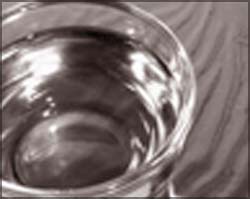Gingili (sesame) oil - nutrition facts
DR. D. P. Atukorale
Gingili (Sesame) is one of the great oil seeds of the world. Gingili
probably originated in Africa and was cultivated in India before it
reached the Mediterranean.
In the first century, gingili oil was exported from India to Arabia
and Africa and then to the Roman Empire. The rich, almost odourless oil
expressed from the tiny seeds which may be black, red or yellow is very
stable.
The gingili oil contains an antioxidant system comprising sesomolinol
formed from sesomolin which substantially reduced its oxidation rate. If
properly stored, gingili
|

Gingili oil |
oil is not likely to go rancid, making it popular as cooking oil in
India, China and Sri Lanka.
It is also highly nutritious, rich in Vitamin A, B and E as well as
minerals iron, calcium, magnesium, copper, silicic acid and phosphorous.
It contains linoleic acid and alph-linoleic acid as well as lecithin and
this explains why it is beneficial to the brain and nervous system.
Like olive oil, gingili oil is considered good for lowering LDL (the
harmful) cholesterol level. The gingili seeds contain 44 to 57 percent
fat which has carotene and high iodine number, linoleic acid content
being about 45 percent and P/S ration greater than 4.
In ancient Mesopotamia as in modern India, it was used in anointing
the body. Cleopatra is said to have used gingili oil as a skin oil.
Gingili oil is used for culinary purposes, in soap manufacture and as
lamp oil.
The seed also contain 29 to 25g protein, 1200mg calcium and 9 mg iron
per 100g and is a good supplement for rice diet. The protein is rich in
tryptophan and methionine and has same nutritive value as groundnut
protein. The press-cake has 40-48 percent protein and has been used in
Central America in correcting under nutrition in children. In Sri Lanka
the press-cake is converted into cattle feed.
Gingili seeds roasted gently in a dry pan could be added to salads,
vegetable dishes, casseroles, meat loaves and stuffing. A paste can be
made from the seeds as a substitute for butter.
Gingili oil is immensely popular in India where its use in oil
massage (Abhayanga) is part of every day life and an important aspect of
Ayurveda.
It is the favourite oil for massage as its chemical structures gives
it a unique ability to penetrate the skin easily nourishing and
detoxifying even the deepest tissue layer.
It is the best oil for balancing Vata and can be used sparingly for
Pitta’ and Kaphe. Used regularly, gingili oil is wonder for reducing
stress and tension, nourishing the nervous disorders, relieving fatigue
and insomnia and promoting strength and vitality. Those persons who use
gingili oil have reported feeling stronger and resilient to stress with
increased energy and is useful for muscle spasm, sciatic pain,
dysmenorrhoea, colic, backache and joint pain.
The antioxidant explains gingili oil’s reputation for slowing the
aging process and increasing longevity and certainly regular oiling of
the skin restores moisture to skin, keeping it soft, flexible and young
looking. It also lubricates the body internally, particularly the joints
and bowels and relieves irritating cough, cracking joints and hard
stools.
Research into the healing effect of gingili oil is beginning to
emerge. A recent research study undertaken to investigate the effect of
gingili oil in treating hypertension patients by Dr. D. Shankar et al in
Department of Biotechnology, Vinaya Mission Foundation University of
Chennai, India shows that gingili oil lowers blood pressure in high
blood pressure patients and patients who consumed gingili oil daily
could omit or reduce the dose of hydroclorothizide (HCT) and atenolol in
case of mild and moderate hypertension.
A significant reduction of systolic and diastolic blood pressure and
Body Mass Index (BMI) had come down when gingili is consumed. Gingili
oil could decrease lipid peroxidase and increase the antioxidant status
of hypertensive patients.
It is good idea if our physicians who are interested in hypertension
do research study using gingili oil for mild and moderate hypertension.
Gingili oil is quite popular among people living in the Northern part of
Sri Lanka.
As mentioned earlier good pure gingili oil does not smell. It is
noteworthy that some of the so-called ‘pure gingili oil’ sold in
boutiques and supermarkets and some of the Ayurvedic drug stores in
Colombo are adulterated gingili oil.
References: ‘Food and Nutrition’ by
Prof. T. W. Wickramanayake |



